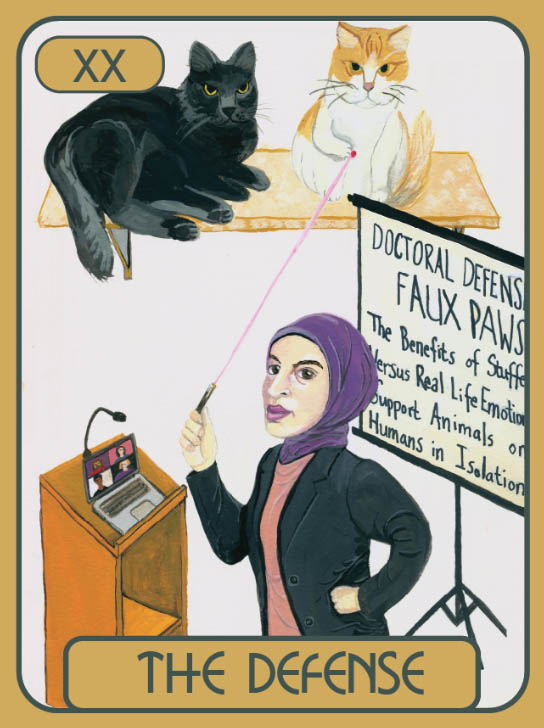The End of the World
I teach DH-oriented project management as a tabletop role-playing game, dubbed the #DHRPG. Participants each play a different institutional role than their own: one undergrad playing a librarian, another playing a grad student, the grad students playing the PI/assistant prof and the postdoc, the librarian playing the undergrad, the non-Humanities Master's student playing the senior faculty department chair. We live a year in the life of a DH project, as the PI simultaneously tries to write their tenure book; they have to roll for tenure at the end. The undergrad has to roll to get into grad school. The postdoc endures the series of dice rolls that are the process of applying and interviewing for academic jobs.
As a pedagogical method for this particular subject, it works really well. Budgets and Gantt charts are easy enough to learn, but getting experience grappling with what to do when different kinds of things go wrong (as they inevitably do with bad dice rolls) -- and witnessing this from various institutional perspectives -- that is precious.
I teach this class every other year, but missed 2022 due to insufficient enrollment, meaning the last iteration ended with final dice rolls on Zoom as campus shut down with covid. It was chaotic and stressful, the pressure of every final dice roll literally in my hands. A week later, my kids' schools also shut down, and there was no more time to dwell on the game. But in March 2024, I find myself with time to dwell, and maybe even to mourn.
The realization hit me in the shower the night before the last day of class: tomorrow the world ends. I've never been responsible for ending the world before. Certainly I've watched the world end innumerable times, tears dripping as I wished for just a few more pages in the universes I'd spent tens of hours in through long series, or memorable standalone novels. As a child, I wrote more creative fiction (narrative, not grant proposals, which is the creative fiction I write now), but it was always some flavor of fanfic. One of the comforts inherent to fanfic is that the act itself is an affirmation that the world does not, and will not end. Your character arc may come to a close, but the universe persists in its infinite variations. Other RPGs share this trait with fanfic: at worst, the whole party is wiped out, but the haunted-looking castle with the suspiciously pale count is still there for your next set of adventurers to encounter, or some other group of the same. After all, it's written down in the adventure guidebook!
The DH RPG coming to a close feels more like a relationship ending. Unlike the first time I taught this class, I let the students come up with the DH project we would do together. They came up with their own characters. I may have been the DM, but that mostly just meant I drew upon my long experience with doing this kind of work to come up with surprises for the characters as needed. What happened over the narrative arc of the game, and how, was more their doing than mine. And there's no handbook -- just a broad framework for character sheets and how to run the DH RPG. Our world was a small fork from reality, populated by characters who these students, from the very beginning of the quarter, really committed to playing, all the way, in their full and messy and fickle human glory.
These characters helped me think about the work I do in a different way. We had our in-jokes. There were acts of selfishness and acts of generosity. Characters coped and struggled and flailed and sometimes just went AWOL on the project for a month or three. The RPG, and our discussions of the readings, were a reliable bright point in my Tuesdays and Thursdays all quarter.
And now it's done. That group of eight and I will probably never sit around a table together again. There's no way to go back to that world; it doesn't exist without those students.
Throughout the class, we drew from the Academic Tarot Deck for the start of the month (or, by the end, the quarter) we were about to play. Before our final round today, we got "XX. The Defense (Judgement)", reversed:

The Judgement card signifies spiritual awakening and absolution, which are also outcomes of completing a dissertation defense. Drawing this card means that you are reaching the completion of a journey, and the universe (symbolized by judgmental cats) is calling on you for something higher. Listen.
Reversed, this card calls for self reflection. Have you been ignoring the work the universe is calling you to do?
We had unfinished business.
So it felt poetic that, once all dice had been rolled, the final tarot card after a good shuffle was, again, "XX The Defense", right-side up:
Drawing The Defense means you may be facing a difficult decision. Like the student approaching their defense, you have reached this point because you already have the information you need to take the next step. Trust in your judgment. You've earned it.
It's true, I knew in that moment what to do.
I gave everyone two regular gray dice and one wild sparkly red die as a parting token from our shared world. "When you're feeling stuck, roll," I told them.
We walked out of the classroom, and with that, the world ended.